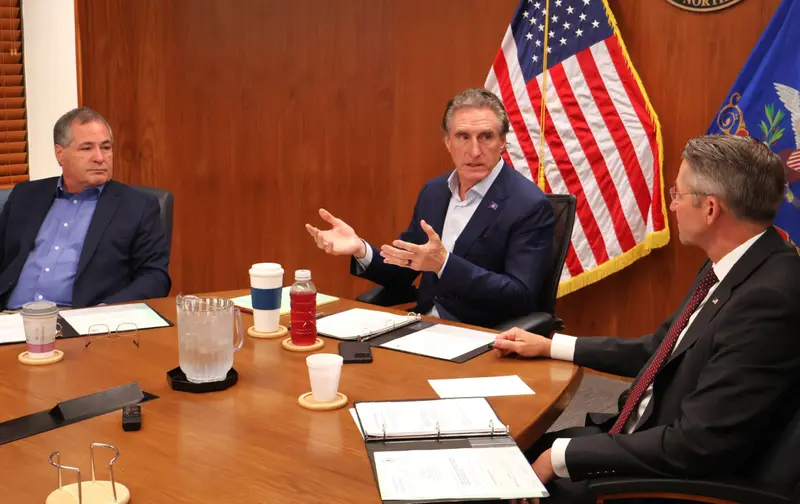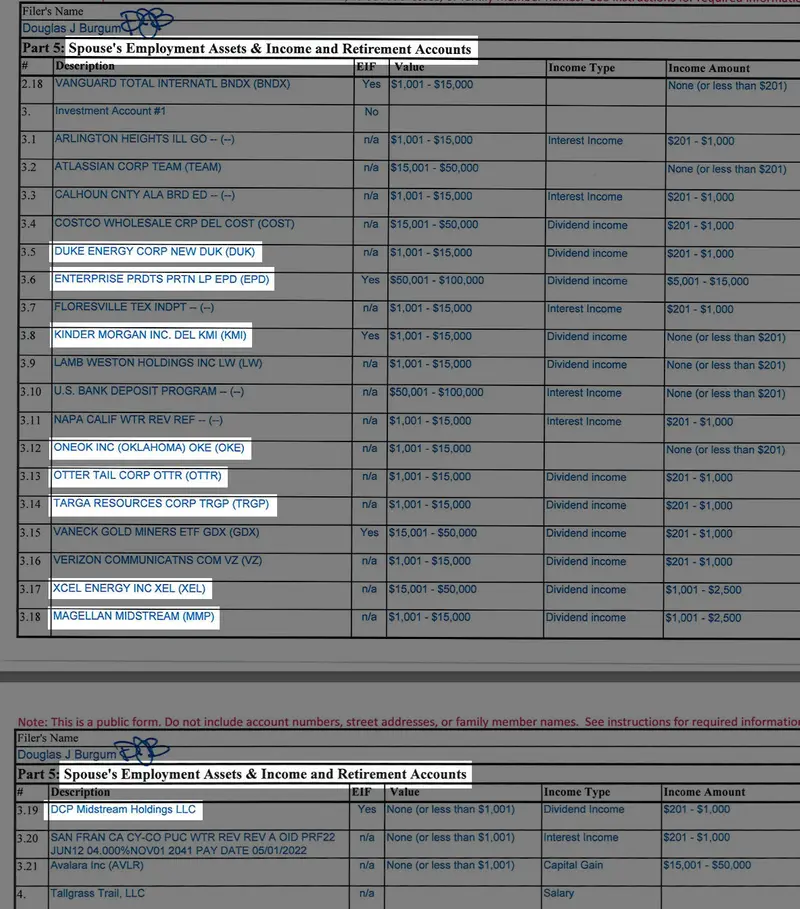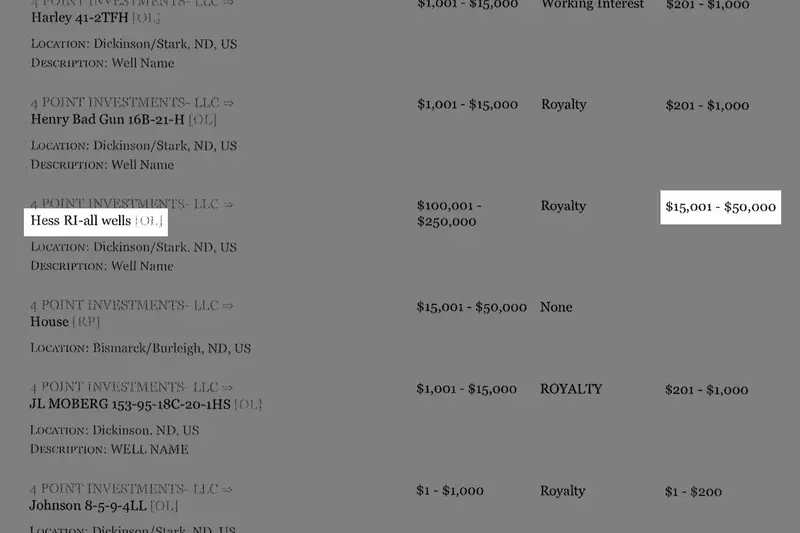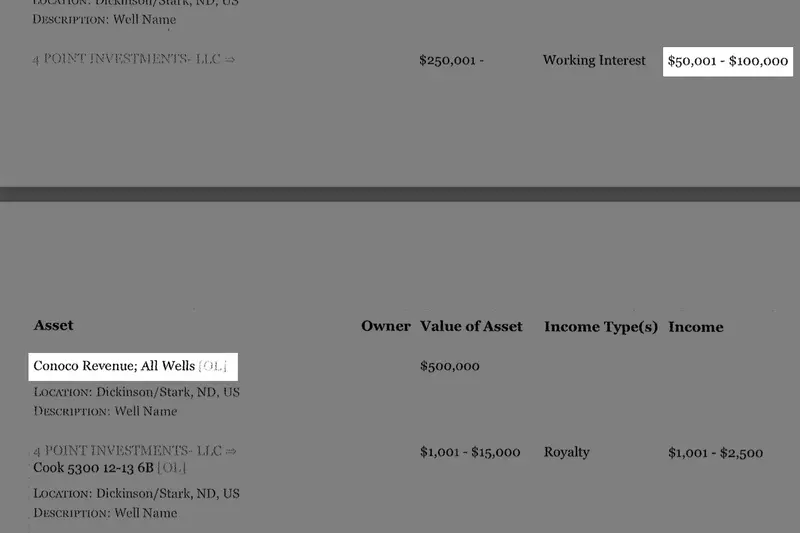This article was produced for ProPublica’s Local Reporting Network in partnership with the North Dakota Monitor. Sign up for Dispatches to get stories like this one as soon as they are published.
Reporting Highlights
- Oil and Gas Ties: North Dakota’s likely next governor has extensive financial dealings with the oil and gas industry, which could pose conflicts, experts said.
- Governor’s Powerful Role: If elected, Republican Kelly Armstrong will head two boards that regulate the industry, with nearly unmatched control and oversight compared with leaders in other states.
- Conflicts of Interest: North Dakota’s ethics rules around conflicts of interest are more lax than other states. North Dakota also has some of the weakest financial disclosure rules in the U.S.
These highlights were written by the reporters and editors who worked on this story.
When Republican Kelly Armstrong filed his federal financial disclosure after being elected to Congress in 2018, he revealed his extensive ties to the oil and gas industry in his home state of North Dakota. It detailed his income from hundreds of oil wells and his financial relationship with two of the state’s largest oil producers.
Those ties will matter a great deal if, as is likely, he’s elected as North Dakota’s governor next month. Under North Dakota’s system, he will automatically chair two state bodies that regulate the energy industry, meaning Armstrong would be expected to preside over decisions that directly impact companies in which he has financial or familial ties.
As head of both the North Dakota Industrial Commission and the Land Board, Armstrong would have a nearly unmatched level of control and oversight compared with leaders in other states. The former state senator would help set policy at a time when North Dakota — the No. 3 oil producer in the nation — is entering a new phase of energy development. The Industrial Commission has faced criticism in recent years from landowners and legislators, including for being too supportive of corporate interests.
Armstrong wrote in an email, in response to questions from the North Dakota Monitor and ProPublica, that he earns nearly all of his personal income from the oil and gas industry. In 2022, Armstrong received up to $50,000 in royalty income from Hess Corp. — a company that has been the subject of 14 votes by one of those bodies in recent years and is likely to be discussed by the boards in the years to come. Similarly, an oil and gas company run by Armstrong’s father had been part of a yearslong, multicompany dispute with the Land Board, which oversees state-owned lands and minerals. Most entities, including his father’s company, have reached negotiated settlements.
The man Armstrong seeks to succeed, Gov. Doug Burgum, has voted about 20 times on issues related to companies with which he has a financial relationship, according to a review of minutes from the Industrial Commission, which is responsible for energy regulation and oversight of state-owned businesses. That includes Continental Resources, one of the region’s largest producers.
The mechanics of how we’ve done things in North Dakota don’t really make sense from an ethics standpoint.
These votes were made under North Dakota’s ethics rules, which are significantly weaker than those in other states. Board members have discretion to decide whether they have a conflict of interest, and the boards are effectively self-policing on this front. The state’s Ethics Commission has created conflict-of-interest rules, but it can only take action if a complaint is filed; it also has not implemented consequences for violating those rules.
Most ethics experts contacted for this article said that royalty owners voting on matters involving companies they receive income from is problematic.
“That’s not just an apparent conflict of interest, that’s a real conflict of interest,” said Dennis Cooley, director of the Northern Plains Ethics Institute at North Dakota State University. “Anything that touches on ‘I’m giving you money for this,’ even with the best intentions, and that’s what I’m assuming these folks have, these representatives have, it’s really hard to separate yourself from folks who pay you.”
Scott Skokos, executive director of the environmental conservation group Dakota Resource Council, agreed. “The mechanics of how we’ve done things in North Dakota don’t really make sense from an ethics standpoint,” said Skokos, whose group has opposed some Industrial Commission decisions. Government, he said, is “supposed to work for the people, and what’s happening is the government is working for corporate interests.”
Armstrong, a lawyer whose father has been involved in the oil industry since 1979, sat for an interview this summer at the GOP’s state headquarters to discuss his connections to one of the state’s largest industries. He said he doesn’t believe his financial ties to oil and gas companies will pose a conflict of interest when he’s asked to vote on matters involving those companies. “I would talk to somebody,” he said in the interview, “but I don’t think so.”
Armstrong said he will not divest his oil and gas interests, nor will he place his holdings in a blind trust. And he said his experience dealing with the industry will be an asset in the governor’s role as “promoter-in-chief” for North Dakota’s energy industry.
“It’s the No. 1 driver of our economy in North Dakota, and I have an incredible knowledge base about what it’s like to grow up in western North Dakota in the oil and gas business,” Armstrong said. “I don’t think that’s a conflict. I think that is a benefit.”
Few Guardrails
Since he was elected governor in 2016, Burgum has cast about 20 votes on the Industrial Commission involving oil and gas companies that lease minerals from a family venture the governor co-owns and at least one vote that benefited a company in which his wife owns stock.
Those votes covered a range of issues including experimental production technology, disputes between companies and research grants.

Credit:
Michael Achterling/North Dakota Monitor
But because of North Dakota’s thin financial disclosure requirements, the public wasn’t informed that Burgum and his family held a financial interest in the companies until he ran for president last year.
That’s when Burgum became subject to more stringent federal requirements; his disclosure report revealed that he receives up to $51,000 annually in mineral royalties combined from Continental Resources and Hess, two of the Bakken oil field’s largest oil producers. The income comes from mineral leases signed through the Burgum Farm Partnership, a family venture co-owned by Burgum and five relatives.
A spokesperson for the governor, Mike Nowatzki, said those leases began long before Burgum took office and have not been the subject of any business that has come before the boards.
Those federal disclosures also revealed that his wife, Kathryn Burgum, held stocks in nine energy companies, more than half of which do business in the state.
One of those, Otter Tail Corp., had business before the Industrial Commision and was the recipient of a $4.4 million grant for grid resiliency approved in a 3-0 vote last December. Burgum voted in favor of the grant.
Burgum’s wife held stock valued between $1,001 and $15,000 in Otter Tail. Multiple emails sent to Nowatzki sought the actual value, as well as comment from Burgum’s wife. The spokesman did not provide either.

Credit:
Document obtained by North Dakota Monitor and ProPublica. Screenshot highlighted by ProPublica.
The exact amount of those holdings matters because the Industrial Commission’s ethics policy prohibits board members from participating in, voting on or attempting to influence any decision on a company they or their spouse owns $5,000 or more equity in if there is a “reasonably foreseeable benefit” to the business from the “matter under consideration.”
Nowatzki asserted that the board’s ethics policy only applies if the governor himself benefited, not the company, and that it’s “absurd” to suggest the grant to Otter Tail “would provide a ‘reasonably foreseeable benefit’ to the governor on a 32-year-old investment valued at under $15,000.”
“The governor has no involvement in management of that account, and it has not factored into any decisions in his official capacity as governor,” Nowatzki wrote in an email.
Richard Briffault, a Columbia University law professor and expert in government ethics, says the stock ownership should have been disclosed prior to any votes. “If a regulator’s spouse has financial interests in one of the entities subject to regulation, that’s as if the regulator himself has a financial interest,” he said.
Had Burgum’s holdings been known, he still might not have been prevented from participating in those votes. The three-member Industrial Commission, which also includes the state attorney general and agriculture commissioner, is one of many entities in North Dakota that uses a version of the “neutral reviewer” process: If a board member discloses a conflict of interest in a matter under consideration, the remaining members vote on whether their conflicted colleague is disqualified. Industrial Commission Executive Director Karen Tyler said the board, which holds open meetings, often does not take a formal vote but has a “discussion and then a consensus whether or not the conflict rises to the level of a disqualifying conflict of interest.”
Three ethics experts told the North Dakota Monitor and ProPublica that they’ve rarely, if ever, seen this process used by government boards elsewhere. It is best practice, they said, for officials with a conflict to automatically recuse themselves.
“I find that to be a bizarre system,” said Cooley, who said he had never seen it used until he moved to North Dakota.
Richard Painter, a University of Minnesota law professor who studies government ethics, called the system “flawed.” “There’s going to be a lot of pressure on the other board members to say, ‘No, it’s OK for you to go ahead and vote; I don’t think you’ve got a conflict,’” said Painter, who served as President George W. Bush’s chief ethics attorney.
In fact, the neutral reviewer system was used when another member of the Industrial Commission, Doug Goehring, joined a 3-0 vote in favor of a carbon storage permit for Red Trail Energy, a western North Dakota ethanol plant in which he said in an interview that he had invested $60,000.
At the time, in 2021, Goehring verbally disclosed that he was an investor; the minutes of the meeting show that “the Commission did not have any concerns” with his participation in the vote. In a recent interview, he described the commission’s evaluation of conflicts of interest as “housekeeping stuff.”
Goehring, who is also the state’s longtime agriculture commissioner, in 2018 verbally disclosed a conflict and abstained from a vote giving Red Trail Energy a $500,000 grant; he did that, he said in an interview, because the action was an appropriation of taxpayer dollars. By contrast, he said he voted for the permit in 2021 because “anybody is eligible for a permit” if the “geology is appropriate.”
“To think that that’s not a conflict of interest is to hallucinate, in my opinion,” Skokos said. “For him to vote on it, having a financial stake in that company, is alarming.”
Goehring also never disclosed his stake in Red Trail Energy on state financial disclosure reports filed between 2010 and 2022 and reviewed by the North Dakota Monitor and ProPublica. Asked about this, he called the omission an “oversight.”
Red Trail Energy is in the process of being sold for $210 million. Initial investors such as Goehring will see a sizable profit from that sale, according to Jodi Johnson, Red Trail Energy’s CEO.
Armstrong’s Holdings
The state’s guardrails against conflicts of interest will be tested if Armstrong is elected governor. His oil and gas holdings outstrip — and compose a far greater share of his overall wealth than — those of the current governor.
I have an incredible knowledge base about what it’s like to grow up in western North Dakota in the oil and gas business. I don’t think that’s a conflict. I think that is a benefit.
“Nearly 100% of my non-salary income is from oil and gas,” Armstrong wrote in an email.
As the GOP nominee, Armstrong is the favorite to be North Dakota’s next governor. Democrats last won statewide office in 2012, and the party has been absent from the governor’s mansion since 1992. Democrat Merrill Piepkorn, a state senator from Fargo, and independent candidate Michael Coachman also are running for governor.
Armstrong, the son of oilman Michael Armstrong of Dickinson, owns widespread mineral interests throughout the Bakken. His 2022 income from oil and gas, according to financial disclosures filed by the congressman, was between $426,674 and $2,460,900. He received up to $100,000 from Conoco and up to $50,000 from Hess, two of the largest oil producers in North Dakota. He also owns 11% of The Armstrong Corp., the family’s business that his campaign described as engaging in oil and gas exploration, among other efforts.


Credit:
Document obtained by North Dakota Monitor and ProPublica. Screenshot highlighted by ProPublica.
Armstrong’s industry interests have grown during his time in Congress. His financial disclosures indicate that the number of wells he earns royalty income from has increased to 475 in 2022, up from 301 in 2018.
He stepped down as vice president of The Armstrong Corp. after being elected to Congress in 2018. He said in an interview he has not made any oil and gas business decisions while serving in Congress.
Armstrong pointed out that states, and not the federal government, have “most of the control over the regulation” of oil and gas production. And he acknowledged the influence he would have if elected in a state where the governor has more sway. By contrast, Texas, the country’s top oil producer, elects members to the body that regulates the industry.
“North Dakota does things very uniquely,” Armstrong said, though he could see benefits to Texas’ approach and would entertain the idea of adjusting his state’s system.
“Ask me after I’ve done it for two years. That’s my answer, we’ll wait and see.”
“Clearly Inadequate Disclosure”
The public only got insight into Burgum’s and Armstrong’s financial positions because of a quirk of political circumstances: In recent years, both had to file federal disclosures.
North Dakota’s disclosure requirements for elected officials call for a fraction of what the federal government or most other states do. The state only requires public officials to file financial disclosure reports when they’re running for elected office, which is every four years for most positions. (Most states require the reports annually.) Officials also are not required to report stock ownership nor the value of their assets. The records are not published online, unlike in most states, and there are no penalties enforced for submitting incomplete or inaccurate statements.
There also is no state authority empowered to monitor such disclosures or offer guidance. The statements of interest are submitted to the North Dakota secretary of state’s office, but Sandy McMerty, deputy secretary of state, said, “There is no requirement for us to check” on the accuracy of those filings.
“That’s clearly inadequate disclosure,” said Painter, the former White House ethics attorney.
Still, Armstrong and Burgum failed to meet North Dakota’s requirements. Armstrong did not list his ownership stake in several family companies in his 2016 disclosure as a state lawmaker. He did include those companies in his 2018 disclosure while running for Congress. Asked why the reports differed, Armstrong said: “I have no idea.”

Credit:
Kyle Martin for North Dakota Monitor and ProPublica
Burgum, meanwhile, failed to disclose on his 2020 state financial report both his ownership stake in the Burgum Farm Partnership, which owns the mineral leases his family has, and his wife’s brokerage account. He disclosed the family partnership, but not the leases, in his 2016 report. He is not running for reelection.
In response to inquiries by the North Dakota Monitor and ProPublica, Burgum filed an amended version of the 2020 report with the secretary of state’s office in September. It now includes the family partnership and the brokerage account, but it does not mention his family’s mineral leases or individual stocks owned by his wife.
Nowatzki said the stocks are managed by Merrill Lynch and the investment account was “inadvertently omitted from previous statements of interest.”
Nowatzki pushed back, however, on any assertion the oil and gas leases should have been disclosed, arguing that that isn’t required of North Dakotans generally. “Tens of thousands of families and mineral owners have similar arrangements,” he said.
Painter said that the leases they held “absolutely” should have been disclosed.
The state’s Ethics Commission was supposed to help mitigate potential conflicts of interest. Created in 2019 as the result of a voter-initiated ballot measure to amend the constitution, three years later the commission instituted conflict-of-interest rules for the legislative and executive branches of government. The rules — which define a conflict of interest and spell out how potential conflicts should be disclosed and evaluated — have proven largely ineffective in part because conflicts are often not disclosed and there are no consequences in the rules for violations.
Rebecca Binstock, executive director of the Ethics Commission, said that body is planning to create new financial disclosure rules and will rectify the lack of what she called “meaningful enforcement.” The commission said last month it’s working with the secretary of state to draft proposed legislation to create a process for enforcing compliance with the state’s financial disclosure requirements.
In 2017, proposed legislation would have required that statements of interest be published online and available to the public for free. (The North Dakota Monitor paid $170 to obtain statements of interest for all candidates on the November ballot.) Ultimately, that effort failed, and the legislature voted only to commission a study of the issue. Armstrong voted against it. He told the North Dakota Monitor that the study was unnecessary because he thought the secretary of state’s office had agreed to publish the disclosures online without a legislative directive. That has not happened.
Armstrong, meanwhile, has campaigned on a promise to “promote and demand transparency.” Still, he said in an interview that he is opposed to increasing the transparency requirements for state legislators.
“Outside the pain in the ass of filing my financial disclosure, I don’t have a problem with doing it at the federal level, but you can’t force that on people here,” Armstrong said. “State legislators would never get it done that way.”
As we report on the energy industry in North Dakota, we want to hear from more of the people who know it best. Do you work for an oil or gas company? Are you a landowner who receives royalty payments? Do you have a personal story to share about deductions from royalty checks? All perspectives matter to us. Please get in touch with reporter Jacob Orledge at [email protected].

